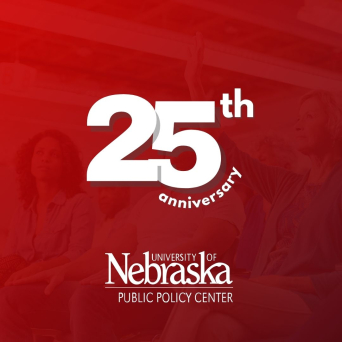Faculty Fellows are faculty within the University of Nebraska system who contribute to the Center’s research, collaborations, and projects. Faculty Fellow status gives formal recognition of their accomplishments and expertise and includes the Fellow in a community of faculty working toward impacting public policies in their respective fields.
Below are just a few examples of the impactful work Faculty Fellows do:
Online Intervention Program for Students, Families, & Schools – Sue Sheridan
University of Nebraska Public Policy Center faculty fellow Sue Sheridan and her colleagues at the Nebraska Center for Research on Children, Youth, Families and Schools are helping meet the needs of rural students by conducting a training program for school specialists with the help of funding from the Institute of Education Sciences. Sheridan and her team have made their successful in-person intervention program, Teachers and Parents as Partners (TAPP), available to school specialists online, so school personnel can access self-paced modules and receive mentoring with online coaches. Sheridan pioneered research that bridges families and schools 30 years ago. Her current research, emulated nationwide, has proven the family-school connection is highly effective in supporting children’s development, particularly those in crisis.
Fighting Fire with Drones – Carrick Detweiler
Faculty fellow Dr. Carrick Detweiler, a professor in the School of Computing at the University of Nebraska–Lincoln (UNL), is helping develop ways to use drones technology to more safely and efficiently manage fires. Dr. Detweiler co-directs NIMBUS Lab at UNL, working with aerial robots and other robot systems. Carrick's goal for his research is to develop systems and algorithms that enable robots to operate in real world conditions to aid scientists, farmers, and others. Detweiler is the co-founder and CEO of Drone Amplified, which sells drone-based fire ignition systems that firefighters can operate to set prescribed burns. Their technology is used by firefighters across the country, taking humans out of harm's way and providing a more efficient method of burning.
Read More in Nebraska Today, UNL’s Above and Beyond feature, or Silicon Prairie News.
Protecting the Grasslands – Dirac Twidwell
Faculty fellow Dirac Twidwell, a professor with UNL's Department of Agronomy and Horticulture, is involved in nationally recognized research on saving the Great Plains grasslands. Dirac Twidwell, a rangeland ecologist, serves as science adviser to the USDA Natural Resources Conservation Service and its Working Lands for Wildlife program. His efforts have contributed to the Great Plains Grasslands Initiative across multiple states, which aims to preserve grasslands from woody plant encroachment. Twidwell and his colleague, Dillon Fogarty, recently published a guidebook for managing woody invasions and sustaining the iconic grassland regions of the Great Plains.
Read full story in Nebraska Today or in the November issue of Wired.
Data Collection from the Arctic Tundra – Brittany Duncan & Carrick Detweiler
Brittany Duncan, a Ross McCollum Associate Professor at UNL's School of Computing, leads a three-year National Science Foundation (NSF) project, which is a collaboration with Ken Tape at the University of Alaska Fairbanks. Another PPC faculty fellow (Carrick Detweiler) and Justin Bradley comprise the rest of the team, who will develop an integrated robot system to collect ecosystem data in the Arctic tundra. The University of Nebraska-Lincoln’s Nebraska Intelligent MoBile Unmanned Systems Lab, known as NIMBUS lab received $2 million to advance robotics’ role in climate change research and push the boundaries of what robotics can do. The team will develop an integrated robot system to collect ecosystem data in the Arctic tundra to measure carbon content in soil and water.
Drought Resilience – Mark Svoboda
Mark Svoboda, the director of the National Drought Mitigation Center, is an expert the science of drought monitoring and the practice of drought planning. As drought resilience and preparedness are taking center stage in the global efforts to bolster economies and communities against natural disasters, a new collaboration between the United Nations Convention to Combat Desertification and the National Drought Mitigation Center at the University of Nebraska-Lincoln is particularly timely. Mark Svoboda, director of the Drought Center and associate professor; the Nebraska-based center is one of several University researchers tasked with recommending approaches to integrated drought risk management focused on drought-smart, land-based solutions.
Read more in Nebraska Today or AP News.
Agricultural Resilience – Craig Allen
Dr. Craig Allen is a professor at the University of Nebraska-Lincoln School of Natural Resources. Dr. Allen's work as director of the Center for Resilience in Working Agricultural Landscapes focuses on agricultural resilience and looks at ways of protecting the agricultural systems that feed the world and the health of the people who inhabit it. Nebraska ecologists Craig Allen and Tala Awada head a team that received a four-year, $400,000 grant from the National Science Foundation to establish the Network for Integrated Agricultural Resilience Research. The network will generate research questions and share data, resources and expertise so affiliated researchers can more comprehensively examine the diversity, complexity and resilience of farming and agriculture in North America at a larger scale than previously possible.

